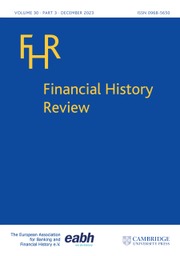Article contents
‘Unwept, unhonoured and unsung’: Britain's import surcharge, 1964–1966, and currency crisis management
Published online by Cambridge University Press: 28 May 2013
Abstract
This article examines Britain's temporary import surcharge introduced in October 1964, a largely overlooked but significant dimension of the 1964 sterling crisis. Import surcharges (temporary supplementary tariff) were illegal under GATT rules and aroused fury among trading partners. Britain's surcharge is placed in context by consideration of the use of import surcharges by other countries under Bretton Woods as currency crisis management and balance of payments measures, notably Canada's import surcharge of 1962–3 that inspired Britain's. Developed by the Conservative administration from 1963, a 15 per cent surcharge was introduced by the newly elected Wilson government as a radical alternative to deflation or devaluation to help correct the record balance of payments deficit and meet the gathering sterling crisis. As a currency crisis management measure the surcharge worked in Canada but in Britain it made matters worse and was soon supplanted by conventional measures. Deemed a failure and discredited, the surcharge was eventually lifted in November 1966 ‘unwept, unhonoured and unsung’ (Financial Times). Nevertheless, while in place the surcharge provided significant temporary assistance to the improvement of Britain's balance of payments.
- Type
- Articles
- Information
- Copyright
- Copyright © European Association for Banking and Financial History e.V. 2013
References
References
Sources
- 6
- Cited by




